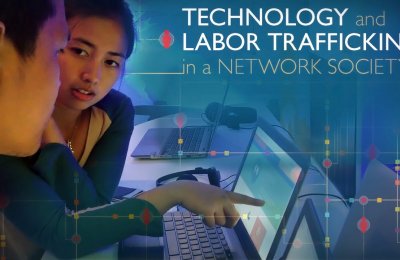By Amelia Brodka
Student Writer
“If you want to know where the world is going,” said USC Annenberg Economist in Residence David C. McCourt to a room packed with students, “don't look to the future. Put yourself in the future and turn around and look backwards and figure out how the present is going to get where you are.”
On April 7, USC Annenberg held its inaugural Economist in Residence presentation with McCourt, who has more than 30 years of entrepreneurial experience in the telecommunications and media industries. His visit was part of USC Annenberg's Media, Economics & Entrepreneurship M{2e} initiative, a semester-long speaker series designed to build economic awareness in journalism and communication students. His topic, "The Road Ahead," offered advice on how students can adapt to and succeed in today's changing media economy.
McCourt opened by discussing how the law of market elasticity that was once the core of media business models has been broken. The “combination of deregulation, competition and innovation” has surpassed the law of supply and demand.
“For the first time, digital revenue is actually down,” McCourt said. “If you look at the financial reports of Time Warner last quarter you'll see that the revenue is down.”
As distribution channels became more advanced, the price of content dropped but the amount of content went up by more than the price dropped.
As media content continues to decrease in scarcity and exclusivity in a flurry of opportunities for free streaming and downloading, media industries “need to build new economic models around those new realities.”
He said if media companies insist on trying to change your behavior like the music industry has with its threats to sue, then they will fail. Instead, “they need to build an economic world around where people are.”
McCourt argued that this rapid production of media can be seen as an application of Moore's Law, which is based on the idea that the number of transistors that can be placed on an integrated circuit doubles every two years.
The media equivalent, which McCourt dubbed the “Annenberg Law,” is that “the amount of video content that circulates around the world will double every 18 months.” He backed this by saying that it would take approximately 72 million years to watch all of the current video content in the world.
With all of this content, asked McCourt, “How do we separate the noise from the signal, the good information from the bad?”
This question led McCourt to advise journalism and communication majors to move into career paths that focus on making sense of media information. McCourt encouraged students to “go into the business of deciphering and separating noise from the signal.”
He urged students to be confident going into these fields instead of fearing the competition of older, experienced generations.
“You have the better deal,” McCourt said. “The experience they have is irrelevant to what is going on in the world.” He added that older generations are now at a disadvantage because so much has changed, said McCourt.
“Go for it and don't worry about failing,” stressed McCourt. “Failing when you're young is painless.”
“You hear constantly that your generation as students – with texting, video games and Facebook – will create an antisocial Attention Deficit Disorder generation of kids,” he said. “I actually think the opposite is true, I actually think you do more in less time than my generation by a long, long shot. It took Gandhi 30 years to overthrow the regime. It took my generation 10 years to overthrow Milosevic. It took the Tunisians six weeks and the Egyptians 19 days.”
McCourt said he has been impressed with the USC Annenberg students during his four-day residency, and that they are fortunate for the educational experience they’re getting. He offered them more advice on how to be successful in their careers.
“I think the single most important skill for anybody coming out of school is the ability to communicate – the ability to figure out what your position is, and to be able to communicate it in a way that makes the recipient of that communication understand it.”
Photos
What do you think? Join the conversation on our Facebook page.








